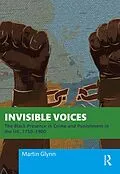Invisible Voices explores the intersection of criminology and history as a way of contextualizing the historical black presence in crime and punishment in the UK. Through case studies, court transcripts, and biographical accounts it reimagines the understanding/s of the role of history in shaping contemporary perceptions. The book:
- Moves beyond the confines of presenting 'criminological history' as monocultural
- Demonstrates how 'mainstream criminology' is complicit in obscuring 'hidden criminological histories'
- Critically assesses the implications regarding the positioning of 'the black presence' within the discipline of criminology
- Revises current thinking around excluded, marginalized, and muted histories, when looking at 'crime and punishment' as a whole.
The opening chapters lay the foundation for locating the historical black presence in crime and punishment, whilst offering practical guidance for anyone wanting to pursue the journey of unearthing hidden history. Chapters 5-9 comprise compelling case studies designed to fuel new discussions regarding important excluded voices in crime and punishment history. The following chapters reveal powerful testimonies from those black voices involved in speaking out against slavery during the Georgian and Victorian periods, and highlight the pivotal role played by black activists during significant periods of British history. Chapter 12 explores 'The Black Rage Defence', illuminating a moment in British legal history which tied both the UK and US into a struggle for validating mental health and offending, where race was a significant factor. The final chapter focuses on the need to engage criminologists in a critical dialogue regarding a reimagining of the way criminological history is (re)presented.
Invisible Voices is crucial reading for students not just of Criminology and History, but also Sociology, Cultural Studies, Black Studies and Law, as well as criminal justice practitioners. It also aims to provide scope for A-Level students contemplating going to university, community educational programmes, and prison education departments, as well as anyone wanting to learn more about the black presence in UK history.
Autorentext
Martin Glynn is a criminologist with over 35 years' experience of working in criminal justice, public health, and educational settings. Martin gained his PhD at Birmingham City University in Feb 2013, where he is currently a lecturer in criminology, alongside being the writer in residence at the National Justice Museum (Notttingham). Published works by Dr Glynn include; 'Black Men, Invisibility, and Desistance from crime: Towards a Critical Race Theory from Crime', (Routledge, Dec 2014), 'Speaking Data and Telling Stories: Data Verbalization for Researchers (Routledge, 2019) and 'Reimagining Black Art and Criminology: A new Criminological Imagination' (2021).
Klappentext
Invisible Voices explores the intersection of criminology and history as a way of contextualizing the historical black presence in crime and punishment in the UK. Through case studies, court transcripts, and biographical accounts it reimagines the understanding/s of the role of history in shaping contemporary perceptions. The book:
.Moves beyond the confines of presenting 'criminological history' as monocultural
.Demonstrates how 'mainstream criminology' is complicit in obscuring 'hidden criminological histories
.Critically assesses the implications regarding the positioning of 'the black presence' within the discipline of criminology
.Revises current thinking around excluded, marginalized, and muted histories, when looking at 'crime and punishment' as a whole.
The opening chapters lay the foundation for locating the historical black presence in crime and punishment, whilst offering practical guidance for anyone wanting to pursue the journey of unearthing hidden history. Chapters Five to Nine comprise compelling case studies designed to fuel new discussions regarding important excluded voices in crime and punishment history. The following chapters reveal powerful testimonies from those black voices involved in speaking out against slavery during the Georgian and Victorian periods, and highlight the pivotal role played by black activists during significant periods of British history. Chapter Twelve explores 'The Black Rage Defense', illuminating a moment in British legal history which tied both the UK and US into a struggle for validating mental health and offending, where race was a significant factor. The final chapter focuses on the need to engage criminologists in a critical dialogue regarding a reimagining of the way criminological history is (re)presented.
Invisible Voices is crucial reading for students not just of Criminology and History, but also Sociology, Cultural Studies, Black Studies and Law, as well as criminal justice practitioners. It also aims to provide scope for A-Level students contemplating going to university, community educational programmes, and prison education departments, as well as anyone wanting to learn more about the black presence in UK history
Inhalt
Section One: Locating the black presence in crime and punishment
- Prologue
- Chapter One - Towards a black (historical) criminological imagination
- Chapter Two - Researching the Black Presence in Crime and Punishment
- Chapter Three - Gathering the Information
- Chapter Four: Don't gaslight me, Slavery Matters
Section Two: Trials and Transcripts
- Chapter Five - The case of Arthur William Hodge
- Chapter Six - The case of John Kimber
- Chapter Seven - The case of Sir Thomas Picton
- Chapter Eight - The case of William Woodcock
- Chapter Nine - The Case of John Hogan
Section Three: Black voices speak
- Chapter Ten - Visible Voices
- Chapter Eleven - Activists
- Chapter Twelve - McNaughton and Black Rage
- Epilogue - Criminologist as Historian
